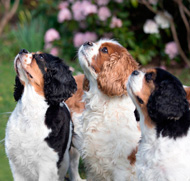
Initiative sheds new light on the condition's prevalence and severity
One in 60 Cavalier King Charles spaniels are affected by the inherited condition syringomyelia, RVC researchers have revealed for the first time.
Cavaliers are thought to be the breed most commonly affected by this condition of the spinal cord, which is potentially debilitating, painful and life-limiting.
Syringomyelia is characterised by fluid filled cavities in the spinal cord that cause pain and neurological problems as they grow. Until now, there has been little reliable data on its frequency and severity among the UK dog population. But thanks to an RVC initiative called VetCompass, which gathers clinical data from first opinion veterinary practices, researchers have been able to shed new light on the condition.
The findings show syringomyelia is not particularly common in the general dog population - affecting one in every 2,000 dogs. Among Cavaliers the frequency is much greater, rising to one in 60. The data suggests nearly 2,000 dogs of the breed suffer from syringomyelia at any one time in the UK.
Furthermore, 72 per cent of affected dogs were recorded as showing pain. The dogs would often yelp or scream when they were picked up or their necks were touched. Many also showed 'phantom scratching', where they would use their hindlegs to scratch at their necks but without making contact with the skin.
Effective painkillers and other treatments are now available for sufferers and early diagnosis can have a big impact on quality of life.
The RVC is urging both vets and owners to be aware of the symptoms to improve early diagnosis and treatment. Signs include sensitivity of the head and neck area, sleeping with a raised head, scratching or pawing the head or neck area, weak limbs and deafness.
Senior lecturer Dr Ludovic Pelligand said the data helps researchers to find out how affected dogs are treated for pain across the UK. "This will help us to understand optimal management and we are currently working on new ways to monitor pain and working towards developing new treatment options to further improve their pain relief and quality of life in the future."
Image © RVC



 The Veterinary Medicines Directorate (VMD) is inviting applications from veterinary students to attend a one-week extramural studies (EMS) placement in July 2026.
The Veterinary Medicines Directorate (VMD) is inviting applications from veterinary students to attend a one-week extramural studies (EMS) placement in July 2026.